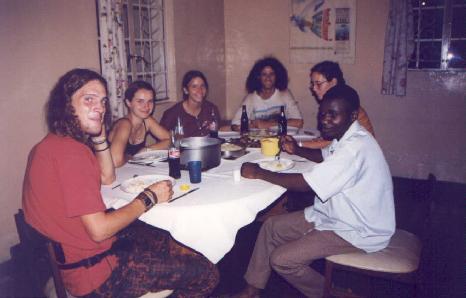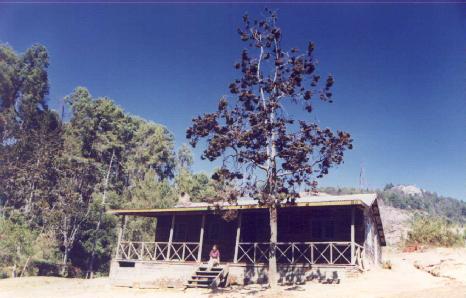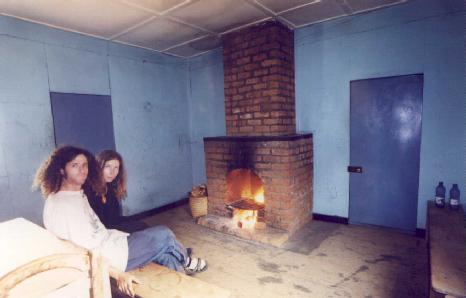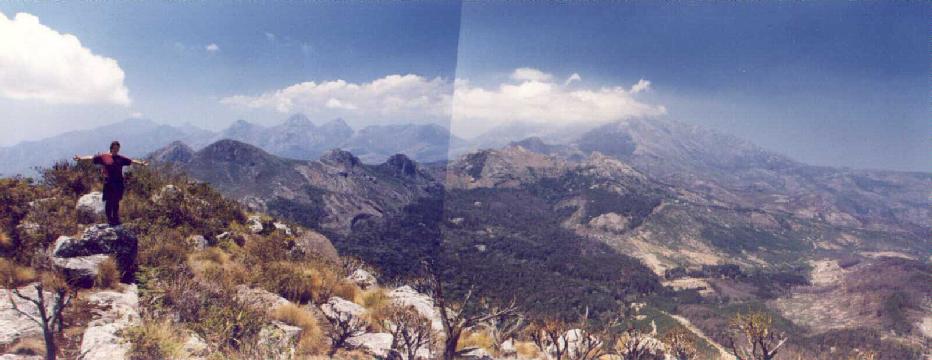Adventures in Africa
Chapter 15 - Malawi I: A Trek in the Mulanje Massif
Malawi is discovered to be a real African
country, not like civilized Zimbabwe. Already while in the territorial
air of Malawi, the pilot shakes us well while landing... Lilongwe, the
capital of Malawi, is a true African town. Many roads are not paved,
there aren't almost any pavements along the roads and no
international chain stores (fast food, clothes or banks) can be
seen. We eat food in the street - much healthier and tastier than the
American burgers... although not necessarily more hygiene... What
bothers us a bit is that although the standard of living is much lower
than in Zimbabwe, the prices are much higher. Actually, there was a
big devaluation in Malawi several months ago, but since then the
prices have been adjusted.
We take the best bus to Blantyre, the second largest
town in the country, and its financial capital. What a bus! there is a
beautiful hostess on board, soft drinks are served with no limits,
there are toilets on board and... it is the first time for us in
Africa to be in an air-conditioned place! After several hours of a
very comfortable ride the bus stops in front of the best hotel in
Blantyre. We go to the hotel recommended to us by the Israelis which
is located, very unsurprisingly, in the market. The hotel is run by
Kiwis from New Zealand. It has a swimming pool and a very nice bar is
located outdoors. What is less nice is the stinginess of the
owners. Although the rooms' price is far from being cheap, and there
are many mosquitoes around, they don't give nor rent mosquito nets,
so we should use ours. Bed sheets are also not included in the price
and should be paid separately. They charge a lot for telephone calls
(even for call backs!), and change money for bad rates. Once, while
sitting in the bar, the waiter prepared mistakenly the wrong
portion. In order not to throw it away he offered it at a 10%
discounted price...
|
We go for a 4 days trekking in the Mulanje
mountains. The mountains are "only" 2,500-3,000 m' high, and aren't of
course covered by snow. The attractions in this area, except its
mild beauty, are the very nice mountain huts which are very well
maintained. Sleeping in the huts is almost for free (1US$) and the hut
keeper brings you water, makes the fire for you (it's a bit chilly
up there) and sometimes even cooks for you! In the first night we
sleep in a hut on the bottom of the trek. When we understand that
ice-cold soft drinks and beers are sold in the hut for nominal prices
and that the hut keeper will cook for us dinner with the products we
will give him, we hurry to the nearby market and buy the rear left leg
of a goat. Needless to say that the dinner is excellent... |

|
|
Needless to say
that the dinner is excellent... |
The Mulanje mountain area is famous for the cider wood
crafts. While being in the hut, some wood carvers come to us and offer
their work for sale. We buy from them a very nice compact-disk stand.
In early morning we start to climb the 1,000 meters
needed in order to reach the second hut, Chambe hut. We take with us
Johnny, a guide who is also a porter. In Chambe hut we sleep with 3
people from South Africa, Kenya and Geneva. They don't have a
porter with them but neither a torch light, nor a pot, nor a scotch
and neither a foam to sleep on. All of these things they borrow from
us. These 3 bring with them 3 living chickens, and each day slaughter
one for themselves. Horrible. They also smoke grass and don't look
interested in the nature around them. We are happy not to be with them
the following nights.
|

|

|
|
Chambe Hut. |
Inside a hut. |
Next day, Johnny the guide shows us the way to climb
Chambe peak at 2,557 m'. Although it doesn't sound high, the
climb itself is very difficult, and on
the limit of technical rock climbing. The third night we sleep again
in Chambe hut. In the following nights we sleep in Chinzama and
Sombani huts. We try to climb also Chinzama peak, this time without
the help of Johnny. We fail since in the summit area there is a maze
of huge boulders very difficult to cross.

The view from Chambe peak.
We arrive back to Blantyre, just for the night. We
take a taxi in order to go downtown (where we will eat an excellent
chicken at Nandos). The taxi looks very lousy. My old Simca is a
princess in comparison with that taxi. The taxi does not start, so
some locals help the driver in pushing it. In the middle of the way
the taxi breaks down, and we are forced to continue by foot. The taxi
driver has the guts to ask us for half of the price since "he did half
of the job"...
Next morning, which is also Yom Kippur eve, we are at
6 o'clock in the central bus station, in front of the yellow
Yani-Yani bus. This bus is supposed to take us to Monkey Bay, near
Lake Malawi. It is in Cape Mclear, a small village on the shore of
Lake Malawi, situated 18km from Monkey Bay, that we want to spend the
last days in Africa. It is here where we will be relaxing before
returning back home to Western world. As we are told, we should be in
Monkey Bay much before sunset, so we will have time to prepare
ourselves for Yom Kippur. In Yom Kippur the Jews ask pardon from God
as well as from their friends, for the sins they have committed during
the last year. One is supposed to fast fully (no food nor drinks) in
that day for about 25 hours non-stop. ItĘs already 7 o'clock and
the driver puts 4 gallons of oil in the engine. We ask him when he
will leave. "Soon" he replies.
At 7 and a half the bus departs at last. Suddenly I
discover that I don't have my wallet in my pocket anymore!!!
Last modified: Sat Jun 19th 21:05:00 IST 1999



